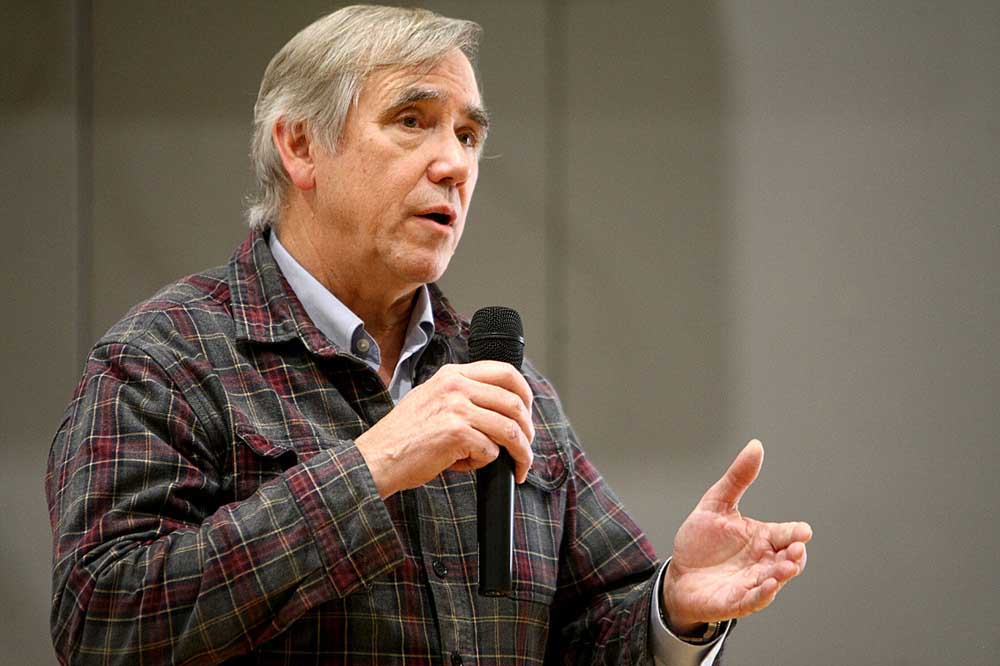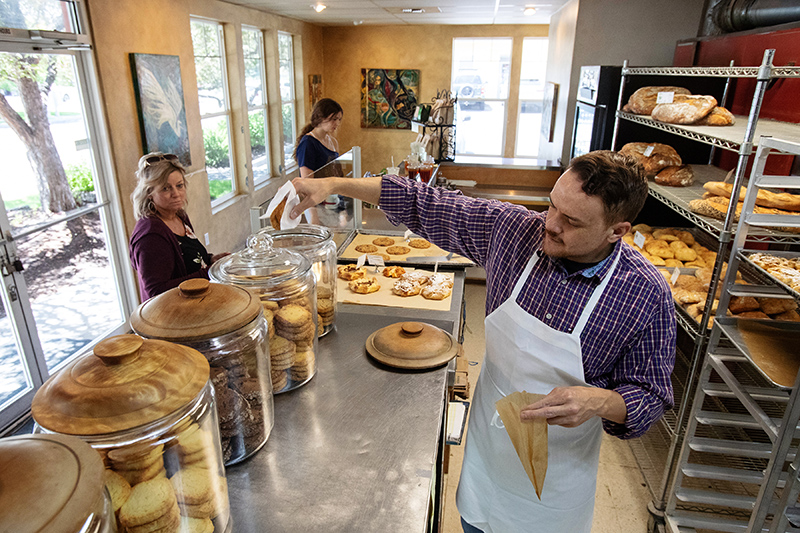Sen. Jeff Merkley has this advice to Oregonians wanting to reduce plastic pollution
Published 11:32 am Monday, December 9, 2024

- U.S. Sen. Jeff Merkley, D-Oregon, addresses an audience of 250 people at a town hall meeting at Lone Pine Elementary School in February 2023.
Oregonians concerned with microplastics seeping into their water supply, soil and foods should reach out to their local representatives and urge them to take action to end the production of single-use plastic products.
That is the message from U.S. Senator Jeff Merkley, D-Ore., who spent time this month in Busan, South Korea advocating for an end to plastic pollution at the United Nations’ Intergovernmental Negotiating Committee on Plastic Pollution. The meeting was the fifth and intended final phase of multiyear series of talks.
“I want to encourage folks to call up their state house member and their state senator and say, this is a real issue. When you go and start your session at the beginning of 2025 in Salem, Oregon, do all you can to tackle this,” Merkley told the Bulletin after returning home from the meeting.
The goal of the meeting in Busan — attended by delegates from 175 nations — was to create a legally binding treaty to reduce the amount of plastic pollution entering the environment, and oceans in particular.
No agreement
The summit ended without an agreement due to gaps over how much to limit new plastics production. Around 100 nations wanted to cap plastic production while some oil-producing countries only agreed to tackle plastic waste and recycling efforts. The countries agreed only to continue talks.
Merkley was the only member of Congress to attend the Busan summit. He also led a delegation that attended the fourth summit in Ottawa, Canada, held in April.
Merkley has been critical of U.S. policies he says are not doing enough to find consensus with other nations and for allowing plastic pollution to enter the environment and oceans.
“High ambition nations said, we really need to take this on with clear goals and accountability. And then you had the petro states, that produce a lot of fossil gas … and they want to greatly amplify their production of plastics for profit. So those two goals were incompatible,” Merkley said.
“I wish the United States had proceeded to join the high ambition nations and signed up for a high ambition treaty and at least set a model for the world and hopefully brought in other nations later. But instead, it all collapsed,” he added.
More Coverage: Bend company looks for inventive ways to recycle plastic into usable products
Merkley panned the argument from some oil-rich nations that production amounts are not the problem. Production of plastic also causes methane leaks and the off-gassing of cancer-causing chemicals, he said. He is urging the U.S. and other nations to take steps to lower production.
“Plastic continuously sheds molecules that become microplastics and then nanoplastics, and we’re finding that in everything from breast milk to the brain,” he said.
Earlier this year, U.S. government policy had shifted towards a more proactive approach to reducing plastic production but last month Grist reported the Biden administration was backing away from commitments ahead of the Busan meeting.
Comparisons to Paris
Progress on limiting plastic is following a similar path of global attempts to reduce carbon emissions. Despite a climate change agreement signed in Paris in 2015 — designed to keep the global average temperature from rising more than 2°C (3.6°F) above pre-industrial levels — emissions continue to rise. Merkley said treaties must be stringent without cutting corners just to get everyone on board.
“That was the approach that was taken on climate and it has utterly failed,” said Merkley. “We produce more carbon dioxide and put it in the environment now than we did in 2015 when Paris was signed. We put more methane into the air then we did then. So just kind of wishing away a problem doesn’t work. You have to have a plan, a set of goals, and you’ve got to have accountability to that plan.”
Merkley said it’s important for individuals to do their part in reducing plastic waste that can end up in rivers that reach the sea, becoming pollution in oceans that harm sea life. But reducing the amount of plastic packaging that comes out of factories around the world is something that happens through agreements and laws.
“Systemically, you only tackle this if you have plans laid out that change the general dynamic around packaging, around single-use plastic, around chemicals of concern, about keeping plastic out of our rivers and our landfills,” said Merkley.
But he remains steadfast in his belief that change will be a grassroots effort and concerned citizens need to reach out to their representatives to demand change.
“Being socially conscious at the grocery store is important but more important is to encourage those who represent you to really take on this issue in a more systemic way,” he said.
Contact your representative
Want to follow the advice of Sen. Jeff Merkley advice and communicate your concerns to local leaders? Bend residents can reach out to the following:
Anthony Broadman, incoming state senator: info@broadmanfororegon.com
Janelle Bynum, incoming member of the U.S. House of Representatives: Rep.JanelleBynum@oregonlegislature.gov
Jason Kropf, House District 54 representative: Rep.JasonKropf@oregonlegislature.gov
Emerson Levy, House District 53 representative: Rep.EmersonLevy@oregonlegislature.gov






